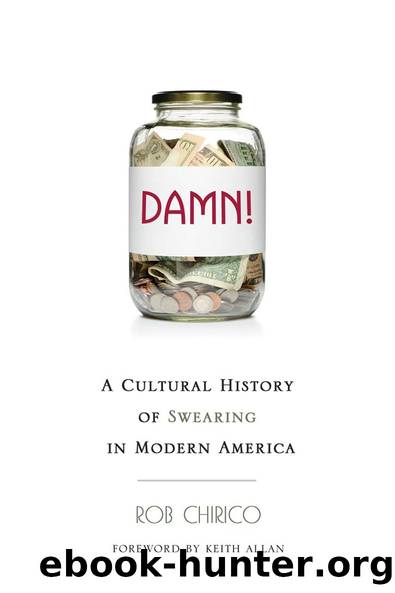Damn!: A Cultural History of Swearing in Modern America by Rob Chirico

Author:Rob Chirico [Chirico, Rob]
Language: eng
Format: epub
Tags: Arts & Disciplines, History, Language, Linguistics, Non-Fiction
ISBN: 9781939578204
Google: jg-eCwAAQBAJ
Amazon: 1939578205
Publisher: Pitchstone Publishing
Published: 2014-12-01T00:00:00+00:00
5
“ALL THE NEWS THAT’S FIT TO PRINT”
“There’s a dirty paper, using sex to make a sale, The Supreme Court was so upset, they sent him off to jail.”
—Phil Ochs, “A Small Circle of Friends”
Writing in Made in America, Bill Bryson pondered, “Never before or since has there been a more confused and bewildering age. To read on the one hand that the New York Times castigated women for saying What a cunning hat, and, on the other, Angela Heywood publicly arguing for the right to say fuck makes it all but impossible to believe that we are dealing with the same people in the same country in the same century.” Yes, the country was the United States, but the century was the end of the nineteenth. The first reference is to a Times’ editorial sternly admonishing women against the growing use of slang in that it betokened a dangerous laxity of morals. The above sentence, “What a cunning hat,” was an example of that dangerous moral laxity. The latter reference is to the early feminist Angela Heywood who objected to being required to use the phrase “generative sexual intercourse” in her lectures. As she put it, “Three words, twenty-seven letters to define a given action … commonly spoken in one word of four letters that everybody knows the meaning of.” The Times may not use generative sexual intercourse in its stead, as it is more likely to use the phrase “four-letter word,” because, at least as of this writing, the paper is one of the last bastions in journalism to disdain the use of the word “fuck.”
But the Times is not alone in its loathing “to contribute to a softening of the society’s barriers against harsh or profane language.” When Sam Zell, the owner of the Tribune newspapers, cursed at an Orlando Sentinel staff photographer in 2008, the Los Angeles Times (another Tribune paper) wrote that Zell threw a “two-word obscenity” at her. Los Angeles Times contributing editor Gustavo Arellano said that the paper should reflect the ownership. He wrote the following in a column:
“Now, I understand that The Times still considers itself a family newspaper, one in which bad words don’t exist and sex ads get exiled to the classifieds section…. And I agree that the gratuitous use of profanity can cheapen an august institution…. But it’s one thing to publish an unedited Howard Stern rant or print a transcript of the latest Paris Hilton sexcapades; it’s quite another when the vulgarity itself is the story. And in the case of Zell, and other public figures who stir up a fuss for the words they use, The Times fails spectacularly.
In response to the recent concern over profanity in public journalism, the Temple University law Web site Journalism in Society posed the following question to its readers: Should newspapers and broadcast news outlets start running curse words as people use them? Or do we have a deeper responsibility to the public?
One reader responded, “It would totally offensive [sic] if newspapers start publishing curse words.
Download
This site does not store any files on its server. We only index and link to content provided by other sites. Please contact the content providers to delete copyright contents if any and email us, we'll remove relevant links or contents immediately.
Cecilia; Or, Memoirs of an Heiress — Volume 1 by Fanny Burney(31333)
Cecilia; Or, Memoirs of an Heiress — Volume 3 by Fanny Burney(30934)
Cecilia; Or, Memoirs of an Heiress — Volume 2 by Fanny Burney(30889)
The Lost Art of Listening by Michael P. Nichols(6474)
We Need to Talk by Celeste Headlee(4869)
Asking the Right Questions: A Guide to Critical Thinking by M. Neil Browne & Stuart M. Keeley(4576)
On Writing A Memoir of the Craft by Stephen King(4213)
Dialogue by Robert McKee(3582)
I Have Something to Say: Mastering the Art of Public Speaking in an Age of Disconnection by John Bowe(3516)
Pre-Suasion: A Revolutionary Way to Influence and Persuade by Robert Cialdini(3414)
Elements of Style 2017 by Richard De A'Morelli(2944)
The Book of Human Emotions by Tiffany Watt Smith(2771)
Good Humor, Bad Taste: A Sociology of the Joke by Kuipers Giselinde(2557)
Name Book, The: Over 10,000 Names--Their Meanings, Origins, and Spiritual Significance by Astoria Dorothy(2490)
Fluent Forever: How to Learn Any Language Fast and Never Forget It by Gabriel Wyner(2446)
The Grammaring Guide to English Grammar with Exercises by Péter Simon(2394)
Why I Write by George Orwell(2359)
The Art Of Deception by Kevin Mitnick(2298)
Don't Sleep, There Are Snakes by Daniel L. Everett(2217)
